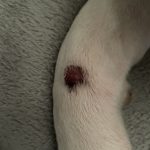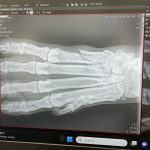Hello,
If you are confident with the diagnosis of a cranial cruciate ligament injury then I do believe that a TPLO is the best way to treat this. As far as your choice of surgeon you can certainly ask your vet or a trusted member of your community for advice.
Hi Krista,
I discovered your YouTube videos yesterday and found your advice on cat care incredibly helpful. My wife and I are caring for our 18-year-old Birman cat, who is in stage 4 kidney disease with significant muscle loss. She’s also struggling with constipation and has other health issues, including high blood pressure and a heart murmur.
Currently, we’re feeding her a mix of wet food (chicken broth, chicken, pumpkin, and egg yolk), and providing SubCut fluids (50ml/day), along with the following supplements:
– Epakitin (0.5g/day)
– Pet-Tinic (2ml/day)
– Lactulose (3ml/day)
– Phos-Bind (0.2g/day)
– Potassium chloride (0.19g/day mixed in the broth – though we’re concerned she’s not getting the full amount since she’s unable to finish the broth).
– In addition, she’s on Amlodipine (0.25ml/day) to manage her high blood pressure.
Despite this, her weight has decreased significantly over the past year. She was once 3.3kg, but a year ago dropped to 2.5kg, and three weeks ago, it dropped again to 1.8kg, despite our best efforts to feed her.
A week ago, we had an enema done at the vet, which relieved some diarrhea, but there was still hardened stool near her anus. We’ve been massaging her abdomen and anus daily to stimulate defecation, and were able to help her pass a large, hard stool last Wednesday. Since then, she’s only passed small amounts of stool – mostly liquid or dark – and has had a lot of difficulty.
Today, we used a Pedia-Lax suppository (1ml), and after about 30 minutes, she passed a larger stool with dark liquid diarrhea. The stool was slightly hard, dark, and very smelly. She’s now very exhausted and resting, but did purr a bit before falling asleep.
For hydration, I gave her 10ml of SubCut fluids before the suppository to prevent dehydration. We’ve seen three different vets, but none have been able to provide lasting relief.
We’re reaching out for advice on whether we’re on the right track and if there’s anything else we can do to help her feel better and poop more easily. Any suggestions, given the circumstances, would be greatly appreciated.
Thank you so much for your time and any guidance you can offer.
Warm regards,
Joel and Sonia
Comments
I was wondering if the Tibial plateau leveling osteotomy is a good treatment for a very active female Akita-husky mix, approximately 2.5 years old? Tater has been spayed, and didn’t react to that procedure well. She “guarded” her abdomen and haunches for over a year. We have moved, so have access to a different vet. Her primary vet office is Price’s Creek (Ohio), who referred her to Medvet for the surgery. I can’t remember the vet who we had Tater’s consultation with at Medvet.
Comments
I have a very special and painful case I need help with, I have tried several different veterinarians with no diagnosis or prognosis so far. It may be a long shot, but I was hoping you could help me shine a light on this.
In April I found an extremely skinny stray cat and took him in. I first thought he was malnourished from lack of food for being in the streets, but 4 months in his case keeps unfolding.
He is likely older than 15 years old, but he’s a happy cat with a lot of energy and mobility. He weighs 3kg but he’s a big cat, you can feel every single bone in his spine, although you can’t see them that easily because he has long hair. He’s completely affectionate, loves to be pet, and asks very politely for attention and food all the time.
All we know about his past is he is neutered, he had some teeth surgically removed and he tested negative for FIV and FeLV.
He had a huge appetite when I first took him in, he would eat 100g of food in one meal and ask for more right after. He would sometimes ‘cough’, it sounded like he was choking on some kind of fluid, it doesn’t happen in sequences, but it happens almost every day until today.
He always drank LOTS of water and produced a lot of urine as well. His feces at the beginning were really solid with some mucus.
After a month, he continued to eat plenty and hadn’t gained any weight, that’s when he started to throw up. It started happening a few days a week, usually after spending several hours without eating he would throw up a clear frothy fluid with no content, and then it progressed to twice every day regardless of when he had eaten.
We suspected it could be diabetes or hyperthyroidism, but the labwork didn’t confirm either, it showed regular kidney function with small liver function alterations.
We then introduced prednisolone (2,5mg/day) and changed his diet from a mix of natural home-cooked protein, hypercaloric wet food, protein supplements, and dry food to exclusively Royal Canin Hypoallergenic while waiting for Royal Canin Gastrointestinal Hydrolyzed Protein to arrive in Brazil, keeping Omega 3 (fish oil) 500mg/a day in his diet.
Vomits went away for a while. He kept drinking lots of water and peeing a lot, but his feces got softer (not liquid).
He had periods where he lost his appetite, which we treated with mirtazapine, he reacted after 6 days.
We performed an ultrasound and discovered that basically all his internal organs were compromised. He has severe alterations everywhere. Still, the best specialists I could find couldn’t tell me what was causing it and offer a course of treatment that didn’t involve opening him up to collect tissues for a biopsy.
I personally think it is absurd that a doctor could look at this frail elderly cat who obviously can’t resist anesthesia without serious risks and say that surgery is the only way to go, all to find out for sure if we’re dealing with a lymphoma or an infection. I’m looking for someone to advise me on the most effective course of action. Of course, I aim to reverse his condition, but I understand that given his age and how advanced it is, it might not be an option.
He is currently at 3kg, eating exclusively Royal Canin Gastrointestinal Hydrolyzed Protein with fish oil, and taking prednisolone every day for a month now. His appetite is healthy, he still drinks a lot, pees a lot, and poops regularly but softer. He eats an average of 5 small meals.
Vomits are back down to a few times a week, usually early in the morning before his first meal, and always a clear liquid. He goes and eats right after throwing up so I get the impression he is not nauseous.
He doesn’t seem to be in pain overall.
He’s not gaining any weight regardless of all my efforts.
That is why I’m giving this a shot and trying to get your attention. I hope you have more resources and knowledge that could help me figure out appropriate next steps to give this little guy the best fighting chances I can.
On this link you’ll find a translation of his bloodwork and ultrasound. I had chat GPT translate it for me so forgive me if there are errors.
Link: https://docs.google.com/document/d/1yqcen-TYzyvfBYU-J4t1tCHola1E2otDGDa1H7V032Y
I appreciate any support you can lend me, his name is Valentim which means brave and strong, and I want him to win this fight.
Comments
I have a 6 year old, female Doberman mix (we rescued her and not sure her exact breed-she is smaller than most Doberman-she is around 44 lbs. About a month ago, she started having accidents in the house, constant urination, and dribbling stream when she actually pees. I thought she probably had a UTI and took her to the vet. They assumed as well she probably had a UTI and gave me a prescription. After ten days on prescription, no change. I went back to vet and told her there had been no change. They started her on Proin. She has been taking this for about 2.5 weeks and there has been no change. When I take her out , she pees about 4 times in a dribble.
They have done blood tests, urinalysis, and x ray. Even after using bathroom twice, her bladder still had urine in it. They are going to send it to a specialist, but we are already about $800 in and no answers. I feel so bad for my girl, because she is embarrassed when she has an accident inside. Any help would be great!
Comments
My dog is predisposed to have reactions to ingredients in every heartworm medication. I have received no definitive answer from my vet as to what to do except to basically play Russian Roulette which I’m not really willing to do. I would like to know if you have any advice on how to herbally treat heartworm without using conventional treatment. He is a husky, German Shepherd, wolf mix he has been DNA tested and he is 20 months old. Any information that you could provide would be helpful. My name is James Dalton and if you need to contact me my number is 864-906-4305. Thank you
Comments
My 18 month old pit bull American bulldog mix , has a spot on his upper paw that’s raised. He licks the spot sometimes. Should I be concerned ?
Comments
Good evening. Before reaching out and scheduling an appointment with vet in the morning. I will ask here.
We have a 9 year old Sharpei-Hound mix named Emma, that has had a significant change in personality with-in the last 3-4 days. Overall her “Normal” behavior is what you would imagine with a blood hound; laid back and basically lazy. But when she’s outside her Sharpei side shows; playful but a little more on the aggressive side.
We have a fenced in property, and ability to closely monitor her and our other dog; a 12 year Chocolate Lab. With that said, 1 week ago February 25th we were going through our bedtime routine. Both dogs went out. Our Lab came back in rather quickly, but Emma stayed out a little longer before making her way back to the door.
When she came inside, she was shaking very much and appeared traumatized. My wife and I attempted multiple times to check her over and give her some love. But very unlike herself she did not want any part of it. She had No signs of cuts or abrasions or any type of trauma. But the only thing was when we touched the top of her head more over her left side she would yelp and whimper.
The next day she was back to her normal self. Only with in the last 3-4 days we are noticing some rather concerning things with her. That has never been previously observed.
1.Today she has developed a lump about the size of an acorn on the top of her head and still cries out when touched.
2. Appetite has not diminished, but she has had an increase in amount of water drinking.
3. She seems to be having trouble hearing.
4. Significant “Spotting” the last 3 days. This has never occurred before. And yes she is spayed.
5. Tonight when letting the dogs out after supper, I found Emma sleeping on her bed but with her eyes wide open and shallow breathing. I initially thought she had passed away suddenly, but after jolting her she awoke and came to in this rather “dazed and confused” state.
6. I would say that she is a slightly lethargic, she still wanted to go out and play but was more stand off-ish when around other dog and kids.
As stated we found no signs of being bitten by another animal, and until within the last day or so she has been her normal self. She has no underlying health problems, and is very active for being 9 years old.
We will be setting up an appointment, but in the meantime looking for help or assistance of others who have experienced this with their dog.
Comments
My little dog Angel (14 yo shin tzu/ Lhasa Apso mix) went to the vet on November 28 due to stumbling , possible blood in stool, and weight loss. The vet said she had no blood in her stool and was diagnosed with intestinal parasites. She was prescribed metronidazole, Regan, and Pepcid. Prior to her starting the medication she was walking but slipping on her hind legs. Also prior to the medication she was eating and drinking water. As the days went by she started dragging her hind legs. I did research and found your videos on the beagel with IVDD. So yesterday December 3rd we took her to a second vet and explained everything that was going on with Angel as well as showing the vet the medications Angel was taking. According to the vet from yesterday the dose was too large for her 7.4 lb frame that she could have developed some neurotoxicity. However the vet said since she was having some difficulty walking prior to the medication then it was more likely IVDD. We were told she was too far along and would require surgery. I ask about oral medications to treat her IVDD and then we were told she was in renal failure. So due to her renal insufficiency and possible upper GI bleed they are unable to give prednisone to help with the inflammation. Angel’s lab work showed an elevated BUN/Creat and she is acidotic. I ask about IV fluids to resolve the renal insufficiency and the vet said we could do IV fluids for 24-48 hours which may only give her a 50/50 chance of renal improvement. The vet then went on to say even if we corrected her renal function she would still have the issue of IVDD and with her dark stools Angel would still not be able to take the prednisone. The final option the vet suggested was euthanasia.
She said we could take Angel home with gabapentin, sucralfate, mirtazapine, and cerenia. Just spend time with her and love on her with an life expectancy of about 2 days.
At this point I’m at a loss because it seemed everything snowballed very quickly.
Today December 4 my adult kids are coming to see her and my husband said we need to take her in for euthanasia on Tuesday December 5th. I feel like I’m giving up on her. The vet said her prognosis is poor and even with surgery she may never have a good quality of life.
Any advice would be appreciated.
Thank you
Comments
Hi there,
I have a 16 month old mix breed medium sized dog. I had her spayed 5 days ago and there’s a bulge to the left of the incision site (size of a tennis ball). Medium firmness.
The vet has suggested it be drained, but he’s 1.5 hours away and I’d rather not inflict another long journey and more trauma on her.
I’ve read that this could resolve on its own and want input as to whether I should take the trip (would you consider the swelling severe) or wait & see if it worsens/improves without intervention.
Thanks for any input.
Comments
Hello and thank you for anyone willing to share their expertise or experiences with toe amputation. My dog Theo is a 14 year old beagle mix and was attacked by another dog a month ago and sustained many injuries but the most severe was a broken 5th metacarpal bone on his front right leg. He has been wearing a splint/cast for a month and just had his 4 week X-ray to check healing and unfortunately it doesn’t appear that much healing has happened. Ultimately my vet had recommended that the fastest and most effective way for him to recover and walk again. Would be to amputate the tie up to the knuckle. I am just concerned about his ability to walk after the surgery and how other people’s dogs, particularly older ones have handled this type of surgery. Because of his age and a previous herniated disc in his back which causes some weakness in his back end he has been unable to walk since the injury. Just hoping to find the right solution to get him back to normal as soon as possible. Any information you can provide would be helpful. Thank you!












Hello,
I’m sorry to hear about your cat.
I think that the question is how to help manage the constipation? I think that the weight loss and progression of the kidney disease is Kelly part of the problem. Have you checked her thyroid function? I typically see these older cats having this disease develop with the others your cat has. This disease also causes muscle loss. But this one has an available treatment option.
I think that you should recheck your blood work and see if’s his might be part of the reason for the constipation.
Also try to encourage play and exercise. It will help her fell better and eat better and also help the internal muscles that assist the colon and avoid constipation.